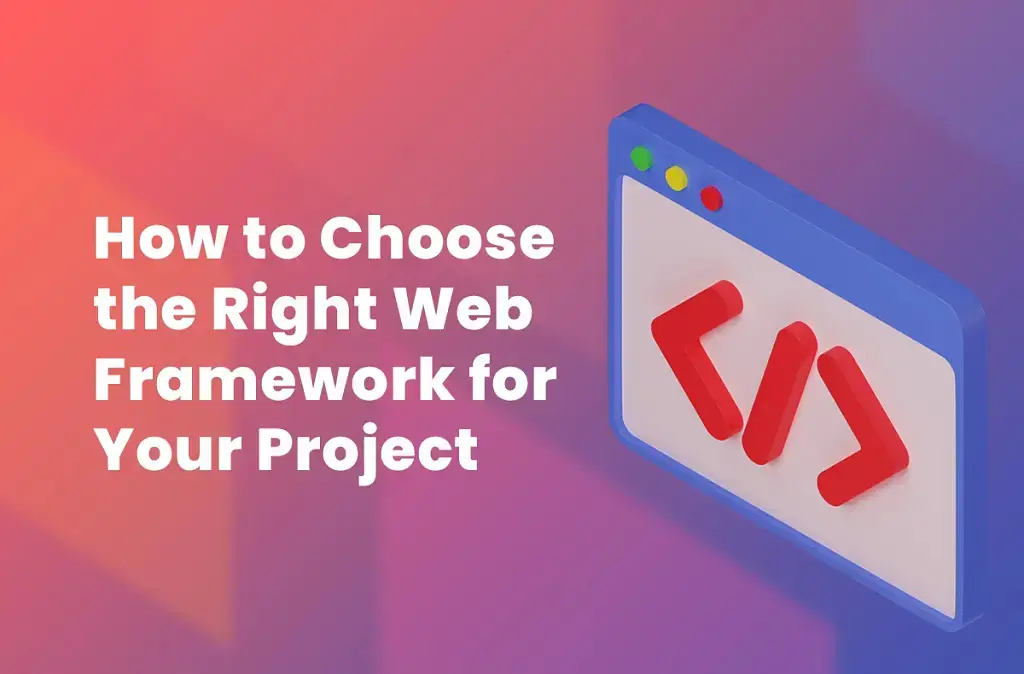When you want to select a framework for your web development project, things may seem intimidating due to the innumerable options available in the market. Your choice will have a major impact on the speed, scalability and maintenance of your project.
In this article, we’ll break down key considerations to help you select the best framework for your next web development project.
1. Understand the Project Requirements
Before even thinking about which framework to use, you must first have a clear understanding of your project’s requirements. Ask yourself questions like:
- What type of website or application am I building?
- Are you creating a single-page application (SPA), a content-heavy website, or an e-commerce platform?
- How complex will the functionality be?
- Do you need features like real-time updates, form validation, complex database interactions, or user authentication?
- What’s your target audience?
- Are you aiming for a global audience with high traffic or a smaller, localized user base?
The answers to these questions will guide you in selecting a framework that meets your needs.
2. Consider the Type of Framework: Frontend vs Backend
Frameworks can be broadly categorized into frontend and backend frameworks.
- Frontend frameworks (such as React, Angular, and Vue.js) are responsible for what the user interacts with directly. They handle the visual elements and UI/UX of your website or application.
- Backend frameworks (such as Django, Ruby on Rails, and Express.js) handle the server-side logic, database interactions, authentication, and everything that happens behind the scenes.
Sometimes, you might need both a frontend and backend framework, especially for complex applications. For example, if you’re building a full-stack web application, you may want to pair React (for frontend) with Node.js and Express (for backend).
3. Evaluate Your Team’s Expertise
The expertise and experience of your development team is another key factor in choosing the right framework. Some frameworks are easier to learn, while others are more complex but offer greater flexibility and power.
- For beginners: If your team is new to web development, it’s a good idea to go with a framework that has a simple learning curve and good documentation. Vue.js, for example, is often praised for its beginner-friendly approach.
- For experienced developers: If your team is already experienced, you might be able to tackle more sophisticated frameworks like Angular or Django, which require a deeper understanding but offer more features and flexibility.
4. Performance and Scalability
The performance of a framework can drastically affect the speed and responsiveness of your website or app. Scalability, on the other hand, is crucial for projects that expect to grow in terms of traffic or complexity.
- For performance: React and Vue.js are known for their fast rendering and virtual DOM implementations. On the backend, Node.js is also recognized for its speed, especially for applications that require non-blocking, real-time data processing.
- For scalability: If you’re anticipating significant traffic growth, you may need to consider frameworks that scale well. Angular is designed with scalability in mind, while backend frameworks like Ruby on Rails or Django are also scalable with the right infrastructure and database management.
5. Community Support and Ecosystem
A strong community and ecosystem are essential for solving problems and getting help when you need it. A well-established framework typically has a large community of developers contributing to open-source projects, creating tutorials, and answering questions.
- React, Angular, and Vue.js have huge communities with extensive resources available online.
- For backend frameworks, Express.js, Ruby on Rails, and Django also have solid support, including vast plugin ecosystems, third-party tools, and active forums.
6. Maintainability and Long-Term Support
You want your web development project to be sustainable in the long term. The framework you choose should be easy to maintain, update, and extend as your project grows or evolves.
- Documentation: Choose a framework that offers excellent, up-to-date documentation. This can save your team a lot of time in the long run.
- Backward Compatibility: Some frameworks update frequently, and breaking changes may be introduced. A framework like React has backward compatibility, meaning your app will likely continue to work as the framework evolves.
- Future-proofing: Ensure the framework you choose is actively maintained. Angular and Vue.js, for instance, continue to be updated regularly with new features, optimizations, and security patches.
7. Integration with Third-Party Tools and APIs
Many web applications require third-party integrations such as payment gateways, analytics tools, or custom APIs. Make sure the framework you select supports seamless integration with third-party tools.
- Backend frameworks like Django or Node.js are highly compatible with a wide range of services and APIs.
- Frontend frameworks like Vue.js and React also integrate well with REST APIs and GraphQL for more dynamic data fetching.
8. Cost and Licensing
Consider the licensing model and any costs associated with the framework. Some frameworks are open-source and free to use (e.g., React, Vue.js, and Node.js), while others might come with licensing fees or offer premium versions with additional features.
- Open-source frameworks are great for most web development projects, especially if you’re working with a limited budget.
- Enterprise solutions may require licenses, such as Angular for large-scale applications or specific tools in the .NET ecosystem.
Popular Frameworks to Consider
Frontend Frameworks:
- React: Ideal for building interactive UIs and SPAs. Known for its component-based architecture and large ecosystem.
- Angular: A robust, opinionated framework ideal for building large-scale applications. It comes with everything you need to build complex web apps.
- Vue.js: A progressive JavaScript framework that is lightweight and easy to integrate into existing projects. It’s gaining popularity due to its flexibility and ease of learning.
Backend Frameworks:
- Node.js with Express: A JavaScript-based backend framework that’s great for building fast, scalable applications. It’s ideal for full-stack JavaScript development.
- Django: A Python-based framework that comes with many built-in features, making it perfect for rapid development. It’s also secure and highly maintainable.
- Ruby on Rails: A mature and popular Ruby-based framework that emphasizes convention over configuration, making it ideal for fast development.
Conclusion
Choosing the right framework for your web development project requires careful consideration of your project’s scope, team expertise, performance requirements, and future growth potential. By weighing these factors and exploring your options, you can select the framework that aligns best with your goals and ensure the success of your project.
Ultimately, the key is to choose a framework that will make your development process efficient, scalable, and maintainable while allowing you to deliver a quality product to your users.

